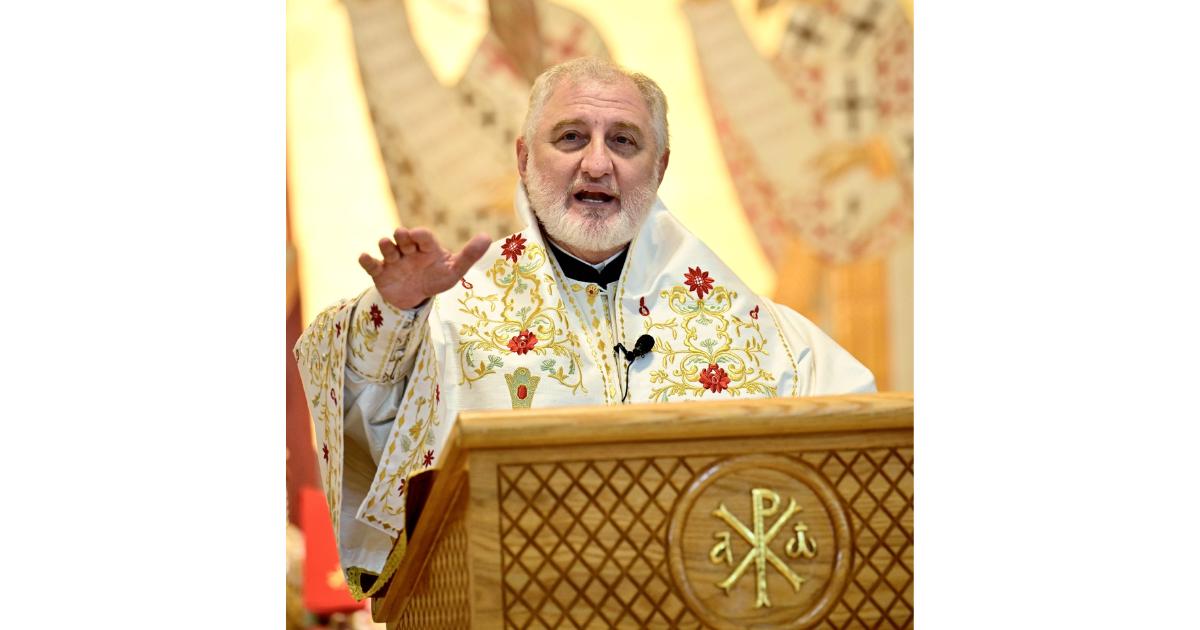His Eminence Archbishop Elpidophoros
Homily at the Divine Liturgy – Sunday of the Prodigal Son
33rd Annual Leadership 100 Conference
March 3, 2024
Saint Katherine Greek Orthodox Church
Naples, Florida
Beloved Brother, Metropolitan Alexios of Atlanta,
Your Grace, Bishop Sevastianos of Zela,
Very Reverend and Reverend Fathers,
Beloved Children in the Lord,
This week, I have been here in your beautiful city of Naples by the Gul, with the members of Leadership 100 – many of whom are participating this morning – in order to further advance the mission and the ministries of our Church.
Today is the Sunday of the Prodigal Son, whom we remember for wasting his inheritance on the transitory pleasures of this world, and who ruined his life by his lack of impulse control and need for immediate gratification. The opposite would be “delayed gratification,” something that the Leadership 100 knows quite a bit about, as they are an endowment fund.
In Greek, ἀσωτία – the word we translate as “prodigality” – literally means “that which cannot be saved.” It is a devasting word that perfectly describes the Prodigal Son, who left his father for a far-off land and there, διεσκόρπισε τὴν οὐσίαν αὐτοῦ ζῶν ἀσώτως – “squandered his resources by living a life of heedless prodigality.” *
Yet, even though this young man lost everything and destroyed all the positive conditions of his existence by his prodigal lifestyle, the Parable reminds of that there is another kind of excess that leads to redemption.
The Prodigal Son poured out all of his resources, wasting them on people and things he objectified to the point of absolute poverty. He now sits in a field of pigs, yearning to eat what he is feeding those animals. We may see him as an extreme example, but if we think about our own lives, each of us has yearnings, appetites, lusts, and passions that have the capacity to consume our lives if they get out of control. We hear of it happening in our communities, and sometimes, even in our families.
But then, it says of this Prodigal: εἰς ἑαυτὸν δὲ ἐλθὼν – he came to himself – or better, he came back to himself. † And he went on: “I will arise and I will go to my Father….”‡ Despite all his failings, he made an active return to his father. And when this happened, we see a ‘prodigality’ far greater than anything the boy had done – the prodigality of love.
Long before the son made it back home, the father runs out to meet him. He falls on him with an embrace and kiss of love. The father gives the Prodigal the best – or as it says in Greek it says the “first” robe, which shows that he is back in the fold.
He puts a ring on his hand and sandals for his feet, the sign that he is no slave, but a free person.§ And then he sacrifices the “fatted calf,” which for us is a sign of the Holy Eucharist, when we eat His Flesh and drink His Blood, that we may inherit eternal life.** Yes, the father’s love was prodigal, excessive to the point of absolute beauty. Some, like the older brother, would say wasteful. Perhaps you remember this story from the Gospel, that took place in the midst of Holy Week:
While Jesus was in Bethany, at the home of Simon the Leper, a woman approached Him, holding in her hand a sealed alabaster flask, full of exceedingly expensive and precious myrrh, which she poured out over His head as He was lying down. When His disciples saw this, they became annoyed and angry, and grumbled, “Why this waste?” ††
Why the waste? But how can such an outpouring of love ever be a waste? It is the extravagant manifestation of love that changes peoples’ lived.
My Beloved Christians: The only prodigality that matters is the prodigality of love. When we are excessive with our love, our forgiveness, our mercy, and our compassion – that is when transformation happens.
So then, let us be wasteful. Not in self-serving craving. Let us be unlimited and infinite in our love and our goodness.
As God is with us.
As the Father was with the Prodigal Son.
As we are called to be with one another.
And thus, we shall all return through this coming Lent to the home of our Heavenly Father, through the redemption offered by His Eternal Son, and the continuing grace flowing in the Church through the All-Holy, Good, and Life-giving Spirit;
Who is glorified and praised unto ages of ages.
Amen.
* Luke 15:13.
† Luke 15:17.
‡ Luke 15:18.
§ Luke 15:22.
**Luke 15:23.
††Matthew 26:6-8.
Photos: GOARCH/Dimitrios Panagos

